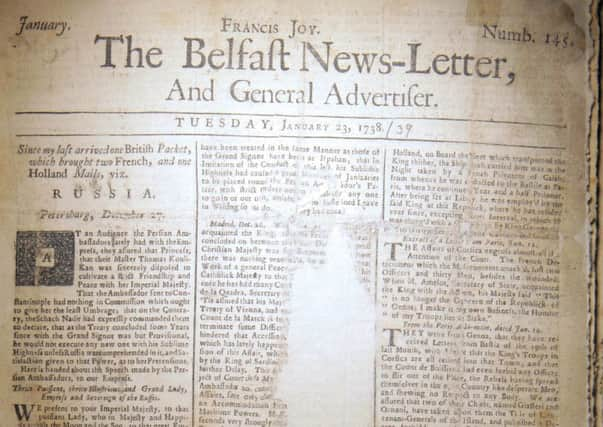Reported this week 280 years ago (February 3 1739): Dublin society urges Linen trade to follow Dutch production methods


Remainder of the DUBLIN-SOCIETY’s last Letter, left out in our Last.
IT was, indeed, in the infancy of the Linen Trade, perfectly practicable to preserve a strict Regard to the regular Distribution of its Branches. In whatever Place it might make its first Appearance it was requisite to cherish it. All Attempts, tho’ improperly directed were then to be encourag’d; and it would have been a dangerous Absurdity to exclude an useful Manufacture, because it did not come in at the right Door. At present, the [unclear, might be Case is] alter;d, we have time for more leisurely and prudent Measures, and all Endeavours to enlarge or perfect it, should now be regulated and determin’d with a View to the different Advantages to be [unclear, might be reap’d] from different Situations.
Advertisement
Hide AdAdvertisement
Hide AdThe chief Reason that our Improvements have been slow, and that the Linen Manufacture is still at a Distance from Perfection, notwithstanding all rational Encouragements, and the generous Endeavours of the Gentlemen entrusted to dispense them - The chief, and perhaps the only Reason, if I do not very much mistake is that all the Parts of it have been carried on together, and, independently of the several Circumstances I have mentioned attempted all of them without Distinction, [words missing] and the same Place. To this we owe — [word missing] first Requisite in the Manufacture is still imported from abroad. [Word beginning with T is obscured] the Materials of it are inconsiderably wasted in the Dressing — And, to speak the whole at once, that nothing besides the single Point of Waving is perfectly understood in Ireland. In the same Method, we must expect the same Miscarriages — And without a proper Alteration in our Measures, ‘tis in vain to hope, or to attempt any considerable Improvements. We have tried the slovenly Way we [word missing] engaged in long enough to be convincing of its [word unclear might be Defects]; The Dutch, notwithstanding our Advantages from easier Rents and lower Wages, undersell us still, and without more Nicety, and greater Care, must forever undersell us. They attend to the minutest circumstances, husband them with an observant Diligence, and dispose the several Branches of the Manufacture in so regular a Manner that no one is [word unclear, might be carried] on but in the very Place where it may best be activated, and at the cheapest Rates. Flax-husbandry is among [word missing] confined to the strongest rich Soils, and is [words missing] Business of one Province. In others, [words missing] Inhabitants are numerous and the Soil inferior to the former, they dress the Flax which the Zealanders have rais’d — And when it is fitted for the Wheel, they send it to be spun in Germany, where Labour and Provisions, which always bear Proportion to each other, are both extremely cheap. From those Parts it returns to the Looms and Bleach-yards in the own rich Provinces, where all Conveniencies can be best procured, and those expensive Branches of the Trade carried on by wealthy Undertakers.
I am sensible it is impossible suddenly to imitate this Conduct where the Manufacture is already settled. Time alone can bring about the Reformation there, and teach our People to let go any single Branch of it: They will hold, till it is wrested from them by better Management in other Places, how much soever they may suffer: But where it has not yet been introduced, or where it is only in its Infancy, I hope this timely Warning, supported by your Approbation and Authority, will engage Gentlemen to think — To consider what may rationally be expected from the Nature of their Land, and from the Number and Circumstances of the Tenants, and to apply their Industry and their Encouragements accordingly. Their own Interest is immediately at Stake — Improper and irregular Attempts punish themselves infallibly at last — And the national and Publick Interest is as deeply concerned as their own. Prudent Measures, for the future, will set every thing right in Time, and those, who are unhappily engaged in too many and inconsistent Branches, will be forced to confine themselves to narrower Limits, to drop some Parts of this extensive Business, and resign them to other Hands, which can perform them at better, and at easier Rates.
It would be an unspeakable Satisfaction, could I contribute any Thing to introduce those prudent Measures. As I am thoroughly convinced they will be attended with Success — What is in my Power to promote them I should be ashamed to decline, I desire therefore your favourable Acceptance of my further Thoughts upon this Head. I shall presume to send them once a Week, till my little Stock of Observations is exhausted.
I am, & c.
[The anonymous author is from the Dublin Society, founded in 1731 to promoted agriculture, arts and industry —later the RDS. Note reference to Zealanders, in Holland, well before New Zealand had been settled]